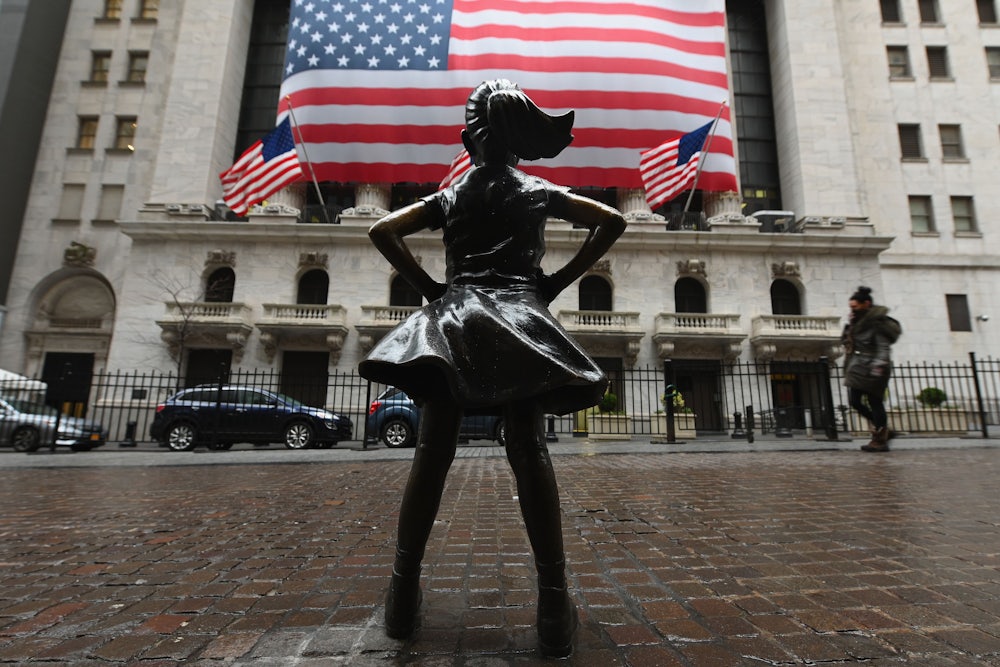I don’t remember doing it, but at some point in the last week I must have turned on my Apple News alerts. “The Dow fell more than 900 points on Friday,” one read. Then another: “Who will be saved, and who won’t?” And another: “How the coronavirus will permanently change our world. Also: The incredible power of walking.” And another: “The Dow posted a 2,000 jump as negotiations in Congress continued.”
As laid out by my colleague Matt Ford, the news from the past few days has been an incessant stream of this brand of financial panic mixed with existential dread. The world may not be ending (yet), but it has come to feel like a simmering pot finally coming to a boil: Politicians are floating the idea that the economy supersedes the needs of living, breathing human beings; cruise and airline companies are demanding bailouts and full control over the terms; senators are doing crimes in broad daylight; billionaire corporatists who did the same are asking regular people for money; and Wall Street executives are getting 20 percent raises as the companies and industries they’ve tethered themselves to lay off workers en masse.
And then there’s this:
WE CANNOT LET THE CURE BE WORSE THAN THE PROBLEM ITSELF. AT THE END OF THE 15 DAY PERIOD, WE WILL MAKE A DECISION AS TO WHICH WAY WE WANT TO GO!
— Donald J. Trump (@realDonaldTrump) March 23, 2020
In The New York Times on Sunday, Thomas Friedman shared Trump’s drive to send people back to work even as the Covid-19 death count rises and hospital workers beg the public to help curb community spread by staying home. This is the Times’ style, effectively arguing the same thing as an all-caps tweet from the president’s addled brain but smoothing out the rough edges to make it sound respectable: After acknowledging the severity of the public health crisis, Friedman wrote, “But we also need to be asking ourselves—just as urgently—can we more surgically minimize the threat of this virus to those most vulnerable while we maximize the chances for as many Americans as possible to safely go back to work as soon as possible?”
Why is this something that America needs to be asking itself? If you adhere to Friedman’s reasoning, one of the answers is that many laid-off workers have been cut off from health insurance and until they return to work, they’ll likely skip the prohibitively expensive medical visits that could help the nation stem this virus. But again, the same question appears: Why? Why is this the desired status quo? Why, in the face of a pandemic that has ruthlessly exposed the American safety net for the sham it’s morphed into, would anyone want to get back to that kind of normalcy? As Friedman accidentally demonstrated in his sprawling ode to social and literal Darwinism, the crisis is Covid-19, but the actual disease we’re confronting is capitalism.
On one of the many family phone calls I’ve been on in the past two weeks, I was asked a question I haven’t been able to shake yet: How are we supposed to feel significant in all of this? Like anything we say or do matters?
It’s not a question that is unique to the situation the coronavirus has thrust the United States into, because none of this is new, really. Disaster profiteering is an American tradition. Consultants and warmongers lined their pockets in the wake of 9/11 while emergency workers were left with medical bills. After the 2008 recession, it was the banks and the auto companies that were valued and saved by Congress, not the victimized working class. Now it will be the cruise and airline companies—even though a plurality of Americans believe the time has come to seize control over the companies they’re bailing out.
While wealth can’t totally insulate you from the virus, it’s clear that there’s a stunning gap between our political leadership and regular people when it comes to the “normal” we need to return to. The Dow matters little to the majority of people, because 84 percent of the market is controlled by 10 percent of wealthy Americans. But it has nonetheless come to symbolize the single metric by which the health of our country is judged. At what point in this current crisis will those at the top finally realize that Americans, and people more generally, are sick not just of this virus, but of the repeated sacrifice of our well-being for a system that views us as only numbers on a spreadsheet?
The truth is the same as it has always been. Capitalism has not consumed America; it is America. Insofar as the concept of this nation is constantly evolving, the past century, and specifically the latter half, has been a study in what happens when governments—federal, state, city, local—reorganize themselves around the notion that profit is the ultimate achievement. In the long run, what happens in the next few weeks and months will not matter to those at the top. People will continue to get sick, people will continue to die. Young and old. The people in power, in Washington and in boardrooms across the country, will pay lip service to the tragedy. But what matters to them deep down is that life returns to normal, because normal was working so ridiculously well for them.
